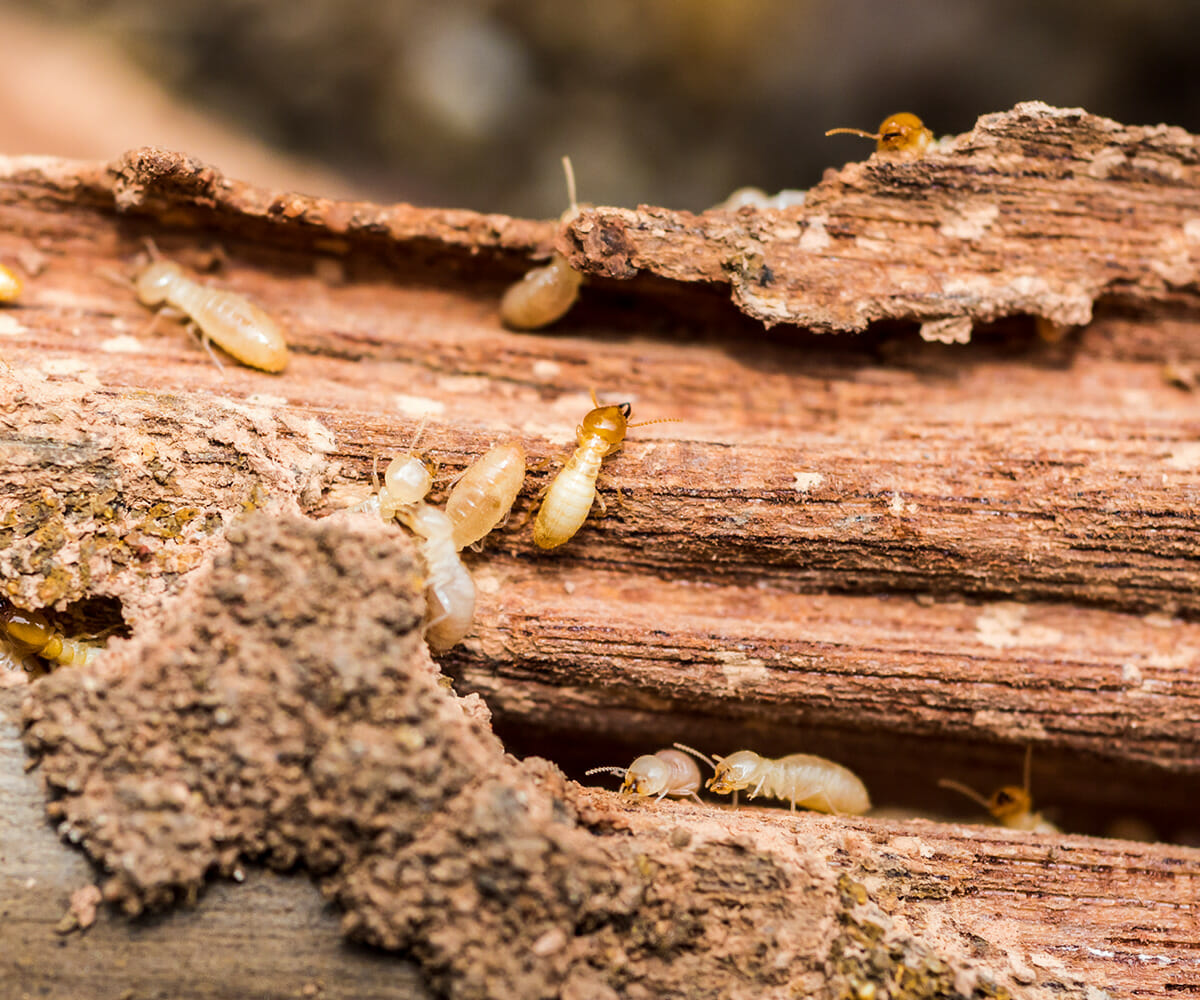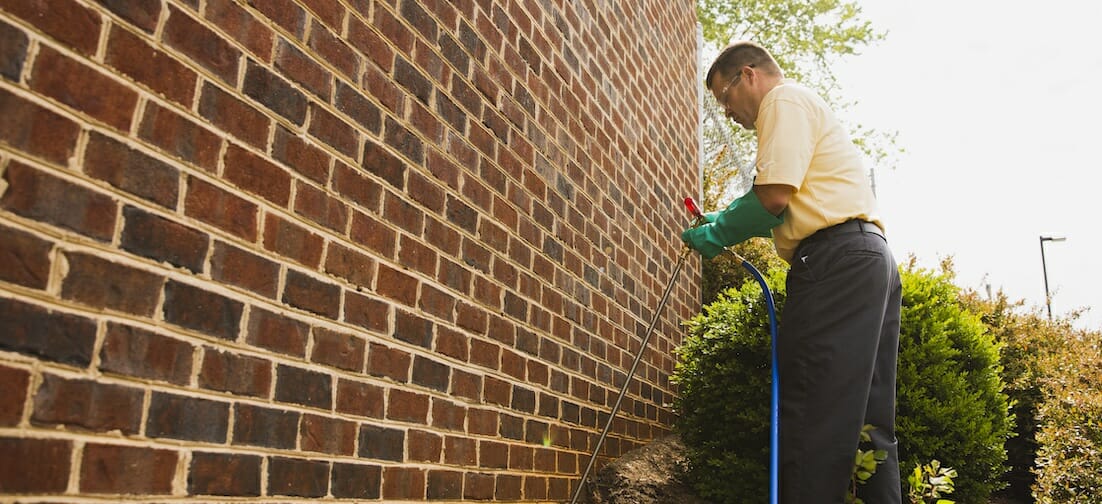Struggling with a termite problem? Deciding how to treat termites can be overwhelming, with a variety of options available. The Dodson Pest Control team met with Dr. Robert Davis of BASF, or Dr. Bob, to discuss the advantages and disadvantages of different termite treatments. Whether you’re considering a DIY approach or seeking professional help, we outline the pros and cons of each path so you can protect your property.
Understanding Termite Infestations
Termites, including subterranean termites, dampwood termites, and drywood termites, are notorious for the significant damage they cause to homes and structures. These insects undergo three stages of growth: egg, nymph, and adult, with the potential lifespan of queen termites exceeding ten years. This longevity, coupled with their ability to consume infested wood from within, can lead to severe structural damage, including compromised ceilings, floors, and even the foundation.
Termites are challenging to treat mainly because of how they behave within their colonies. Termites can quickly take over an entire structure and hide anywhere they can so long as they’re close to a food source.
According to Dr. Davis, “The toughest thing about termites is they’re [protected]. They’re in the soil. They’re under the slab. They’re in the walls. Sometimes they’ll create what we call an aerial colony up in the wall, and then that makes it even more difficult to get to.”
What factors make your home attractive to these destructive pests? Well, termites are drawn to moist conditions, and their diet consists of cellulose-rich wood. Homes with moisture issues, such as leaky pipes, improper drainage, and poor airflow can become hotspots for termite infestations. A professional pest control company can help identify early signs of termite damage and provide the necessary termite treatment to prevent infestations.

Chemical Treatment Methods for Termites
Pest control professionals favor chemical treatments for quickly eradicating a termite infestation. Liquid termiticides, foams, and dusts are common choices due to their efficacy in eliminating termite colonies and protecting your home from future problems.
Liquid Termiticides
Among liquid termiticides, Termidor stands out for its high effectiveness. The active component in Termidor is Fipronil, known for its high efficacy in impacting entire termite colonies. Termidor establishes a strong bond with the soil, forming the Termidor Treatment Zone, which is exceptionally efficient in eradicating termite colonies and offering enduring protection, especially against subterranean termite colonies.
According to Dr. Bob, Termidor is slower acting than other solutions, but it’s virtually undetectable by termites. “In 2000, we launched Termidor, and it just changed this industry dramatically. One of the biggest changes is that non-repellant chemistry transfers. We were able to show that we can treat around the perimeter of a structure and get the same efficacy as taking other products and treating everything you can. You can still get the same efficacy because we’re using that termite behavior to help us with transfer. So now you’re drilling less. You’re being less invasive.”
Termidor can be applied effectively through various methods, including soil spraying, trench pouring, and foundation wall application. When used in conjunction with termite baits, Termidor provides comprehensive protection against termites.
Pros:
- Highly effective
- Low impact to homeowners
- Usually comes with a 10-year warranty
Cons:
- Can be pricey
Foams and Dusts
For hard-to-reach areas, foams and dusts can be particularly effective. Lethal foam treatments can provide comprehensive coverage in inaccessible areas. Dusts can penetrate tiny openings and adhere to surfaces, effectively eliminating termites.
When applied, termite control foam expands to fill all available space, including cracks and crevices, ensuring thorough coverage. Dust treatments, on the other hand, disrupt the termites’ exoskeletal functions, leading to their demise.
Pros:
- Relatively affordable
- Flexible to your home’s unique structure
Cons:
- May require more frequent applications
- Might not eliminate a colony at its source
Termite Repellents
Termite repellents are specialized substances designed to deter termites from infesting structures and causing damage. These repellents typically work by creating a barrier that termites find inhospitable, preventing them from accessing the treated area. Common active ingredients in termite repellents include chemicals like bifenthrin and permethrin. These substances disrupt the termites’ ability to navigate, communicate, or feed, acting as a deterrent rather than a lethal poison. Termite repellents come in various forms, including liquid sprays, granules, and foams. Professionals recommend regular applications to maintain an effective barrier and protect against termite intrusion as a preventative measure.
Pros:
- Non-lethal option
- Available over-the-counter to non-licensed professionals
- One of the most affordable options
Cons:
- Less effective than lethal treatments

Bait Systems for Termite Control
Apart from chemical treatments, bait systems contribute significantly to termite control. In-ground and above-ground bait systems can be an effective and environmentally friendly way to monitor and control termite populations. Bait stations can also be placed to supplement chemical treatments.
In-Ground Bait Stations
In-ground bait stations are strategically placed below the ground to encircle a building. Their primary function is to intercept termites before they enter the structure. As termites feed on the bait, they become contaminated and spread insecticide throughout the colony.
According to Dr. Davis, “They’re so good at foraging and looking for food. So they’re gonna forage then hit that station. When that bait is in their system, they molt incorrectly and die.”
These stations are typically installed by inserting them into augured holes in the ground, ensuring the cover is flush with the soil surface. They are commonly positioned approximately 1-2 feet from the foundation and spaced at intervals of 10-20 feet from one another.
Pros:
- Very effective
- Relatively child and pet-safe
Cons:
- Requires more drilling than chemical options
- Slower acting than other solutions
Above-Ground Bait Stations
Above-ground bait stations, on the other hand, are positioned directly over areas of termite activity. They proactively target the infestation at its origin without relying on termites encountering them.
These stations are particularly effective in controlling subterranean termites and can initiate a reduction in termite populations within a few months, provided that termites discover and consume the bait.
Pros:
- Effective for localized infestations
- Great for outdoor use
Cons:
- Can be harmful to wildlife if not properly installed
Want a Professional Opinion?
Contact Dodson Pest Control.
Natural Treatment Alternatives
Despite the effectiveness of chemical termite insecticides, some homeowners lean towards natural, environmentally friendly termite control options. Essential oils and borates offer such alternatives, though they are significantly less effective than their professional counterparts.
Essential oils, such as cedar oil and orange oil, allegedly repel or inhibit termites. Borates, on the other hand, disrupt termites’ digestion and render treated wood unappealing to them.
Essential Oils
Essential oils can be slightly effective in repelling or inhibiting termites. However, compared to traditional chemical treatments, essential oils are not as potent.
Cedarwood, orange, and neem oil are the most commonly used essential oils for warding off termites.
Borates
Borates, including borax, are naturally occurring salts that eliminate termites by disrupting their digestion. Borates render treated wood unappealing to them and can kill termites when consumed.
However, professionals don’t usually consider borate treatments stand-alone solutions for termite control because they’re not as transferable as other solutions and don’t always eradicate the entire colony.
Preventing Termite Infestations
Since termite colonies can quickly infiltrate and take over your home, prevention is key. Implementing proactive measures, such as moisture control, lawn maintenance, and regular inspections, can help you stay a step ahead of these destructive pests.
Moisture Control
Termites thrive in moist environments, and other pests do, too. When wood is stored in moist conditions, it can start softening and deteriorating — making it the perfect meal for termites. Strategically placed dehumidifiers can help maintain the right moisture levels in your home. If you have a basement prone to accumulating standing water, you may want to consider implementing measures to prevent future water collection. Keeping your home dry can create a less appealing environment for termites.
Lawn Maintenance
Termites live outside and go indoors in search of food. Piles of wood or mulch, fallen trees, leaf piles, and cut logs can all provide a food source and shelter for termites. By keeping your property free of these outdoor termite hot spots, you can reduce the likelihood of termites migrating indoors.
Regular Inspections
A pest control professional can perform routine termite inspections to look for signs of termites. Your inspector will check outside your home, paying close attention to wood piles, mulch, wood beams, window sills, door frames, and other areas where wood interfaces with soil. Once inside, your inspector will look for signs of termite activity, including discolored or drooping drywall, peeling paint resembling water damage, and hollow-sounding wood when tapped. A termite inspection usually takes thirty minutes to an hour, depending on the size of your property.
Hiring a Professional Pest Control Service
Occasionally, despite taking all precautions, termites might still infiltrate your home — and that’s where Dodson Pest Control can help. We take an integrated pest management approach and consider your infestation’s unique circumstances. Whether you need a chemical treatment, bait stations, or a mixed-method approach, we can help you get rid of termites and restore your peace of mind. If you’re just looking for recommendations for preventing termites, we can help with that, too.
Contact Us Today

